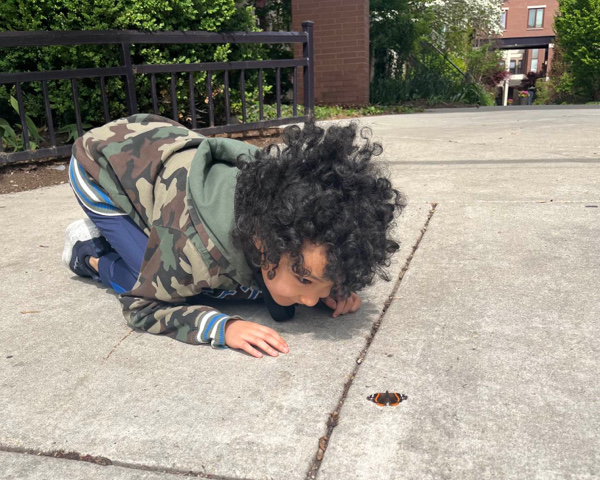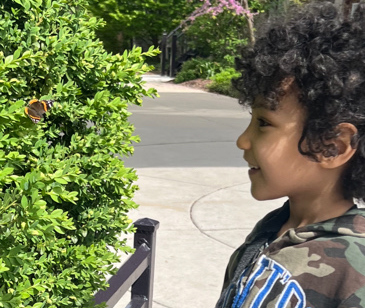We often say, “Stop bugging me!” or “Don’t let the bed bugs bite.” These common phrases express feelings of annoyance or fear. But have you ever considered why these small creatures hold such a strong place in our language and minds and why some people are scared to death of them, while others are fascinated with them?
For many families with neurodiverse children, a family fascination in bugs can actually turn into an exciting journey and open up incredible pathways. Bugs can foster learning, build connections, and help children understand the world around them in a fresh, engaging way. By embracing discovery, we can transform potential fears into exciting opportunities for growth.

What Exactly Are “Bugs”?
Before we explore our feelings about them, let’s clarify what we mean by “bugs.” In our everyday conversations, “bug” is an umbrella term for a huge variety of small creatures, from beetles and ants to spiders (which are actually arachnids, not insects). Scientifically, true bugs belong to an order called Hemiptera, but for our purposes, we’re talking about the whole world of creepy-crawlies.
The insect world is incredibly diverse, with over one million described species. They are ancient, over 400 million years old, long before the dinosaurs. They have survived multiple mass extinctions and adapted to nearly every environment on Earth. Without insects, especially pollinators, our world would be dramatically different.
The Science Behind Our Fear of Bugs
When something “bugs” us, we’re comparing an annoyance to the persistent, hard-to-ignore presence of a cockroach or a fly. This fear, however, is often learned and reinforced by our culture. Many children are naturally curious about insects until an adult teaches them to be afraid.
Psychologists point to a few key factors that contribute to insect phobias:
- Unpredictability: Their small size and rapid, erratic movements can startle us.
- The “Otherness” Factor: With their compound eyes, multiple legs, and exoskeletons, insects seem alien.
- Fear of the Unknown: Their ability to appear suddenly taps into our fear of the unexpected.
When you combine these primal fears with cultural messages about “pests” and “dirt,” it’s easy to see how negative associations develop.
When Bug Fascination Is a Superpower
While many adults feel uneasy around bugs, for many children, especially those on the autism spectrum, insects can be a source of incredible fascination. What might look like an obsession to others is often a gateway to developing amazing skills.
We understand that supporting a child’s intense interest can feel daunting, especially if you are afraid of bugs. But it’s also an incredible opportunity for a lifelong activity that can foster tremendous growth. This deep focus on a special interest aligns with the systematic and detail-oriented thinking common for children on the spectrum. Insects offer endless opportunities for skills that are highly valued in science and academia:
- Categorization: Sorting beetles by color, size, or species.
- Pattern Recognition: Identifying the unique patterns on butterfly wings.
- Systematic Observation: Memorizing the complex life cycles of different insects.
For these children, bugs aren’t creepy; they’re fascinating puzzles. They notice details that people often miss, like the subtle way a caterpillar moves or the mathematical patterns in a honeycomb. This focused attention is a remarkable strength. Parents often find that supporting this interest leads to shared adventures and creates a comfortable space for communication and connection outside of more structured settings.

The Hidden Benefits of Bug Appreciation
Whether you’re supporting your child’s passion or trying to overcome your own unease, learning to appreciate insects offers surprising benefits for the whole family.
- Promotes Mindfulness: Observing an ant colony or watching a spider spin its web requires you to be present in the moment. This can be a calming, meditative practice for both children and adults, reducing anxiety.
- Connects to Bigger Concepts: Insects provide tangible examples of complex ecological ideas. Watching bees helps children understand pollination, while observing beetles can teach them about decomposition. It’s a hands-on way to learn about interdependence and biodiversity.
- Develops Critical Thinking: Research shows that children who spend time in nature, including observing insects, develop better critical thinking skills and increased creativity. For neurodiverse children who may struggle in a traditional classroom, the outdoors becomes a learning environment where their unique strengths can shine.
From Fear to Fascination
Embracing your child’s interest in bugs and trying to see them in a new light starts with small steps. The next time you see an insect, pause before reacting or swatting it. Look closer. Notice its patterns and movements. These moments can shift your family’s perspective from annoyance to wonder.
For families navigating neurodiversity, these encounters are especially meaningful. When a child gets excited about a beetle, they are engaging with their world, practicing observation skills, and building the focused attention that supports academic success.
In the Chicago area, you can turn this interest into a fun family outing. Here are a few great places to explore:
- Peggy Notebaert Nature Museum: The Judy Istock Butterfly Haven is a beautiful indoor conservatory.
- Chicago Botanic Garden: The pollinator gardens attract countless bees, butterflies, and other fascinating insects.
- Local Forest Preserves: Places like Busse Woods or Waterfall Glen are perfect for family bug-hunting expeditions.
Let’s Write a New Story Together
The story of humans and insects is ancient, and it’s still being written. By supporting your child’s unique interests, you’re not just encouraging a hobby; you’re nurturing a potential scientist, a keen observer, and a confident learner. You are validating their way of seeing the world and showing them that their passions have value.
At Merlin Day Academy, we believe in embracing each child’s unique journey. We understand that progress comes from building on individual strengths and turning special interests into avenues for growth. We’re here to provide the tailored educational and therapeutic support that helps them thrive.
Ready to see how your child’s unique interests can become their greatest strengths? Contact Merlin Day Academy today for a tour and discover our individualized, family-centered approach to learning.
